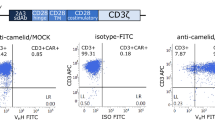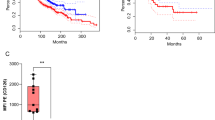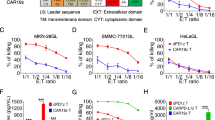Abstract
Chimeric antigen receptor T (CART) cell therapy has demonstrated promising potential in the treatment of hematologic malignancies. However, its application to solid tumors is limited due to the restrictive nature of the tumor microenvironment, resulting in functional failure and poor persistence of CART cells. Overexpression of Bcl-2 in human CART cells (hCART) has been found to significantly enhance their anti-apoptotic effects both in vitro and in vivo. Nevertheless, the evaluation of hCART cells in preclinical studies has predominantly relied on immunodeficient mice xenograft tumor models, making it challenging to assess the impact of hCART cells on normal tissues and the immune system. We established a murine CART (mCART) that overexpresses Bcl-2 and targets the epidermal growth factor receptor variant III (EGFRvIII), named EGFRvIII·mCART-Bcl2. It demonstrated superior proliferation, cytotoxicity, and anti-apoptotic capabilities in vitro. In an immunocompetent mouse model of abdominal metastasis of colorectal cancer, EGFRvIII·mCART-Bcl2 exhibited improved survival of CART in the abdomen, increased tumor clearance, and significantly prolonged overall mouse survival. In summary, our study provides evidence that the introduction of Bcl-2 into mCART cells can enhance their therapeutic efficacy against solid tumors while ensuring safety.






Similar content being viewed by others
Data availability
The authors confirm that the data supporting the findings of this study are available within the article.
Abbreviations
- CART:
-
Chimeric antigen receptor T cell
- EGFRvIII:
-
Epidermal growth factor receptor variant III
- Bcl-2:
-
B-cell lymphoma 2
- ALL:
-
Acute lymphoblastic leukemia
- Fluc:
-
Firefly luciferase
- ConA:
-
Concanavalin
- IL-2:
-
Interleukin 2
- E:T:
-
Effector-to-target
- ELISA:
-
Enzyme-linked immunosorbent assay
- IFN-γ:
-
Interferon-γ
- nATC:
-
None-transduced activated T cell
- FACS:
-
Fluorescence activated cell sorting
- HE:
-
Hematoxylin and eosin
- TME:
-
Tumor microenvironment
- GVHD:
-
Graft-versus-host disease
References
Wei J, Long L, Zheng W, et al. Targeting REGNASE-1 programs long-lived effector T cells for cancer therapy. Nature. 2019;576:471–6.
Delbridge AR, Strasser A. The BCL-2 protein family, BH3-mimetics and cancer therapy. Cell Death Differ. 2015;22:1071–80.
Vuletic A, Konjevic G, Milanovic D, Ruzdijic S, Jurisic V. Antiproliferative effect of 13-cis-retinoic acid is associated with granulocyte differentiation and decrease in cyclin B1 and Bcl-2 protein levels in G0/G1 arrested HL-60 cells. Pathol Oncol Res. 2010;16:393–401.
Singh R, Letai A, Sarosiek K. Regulation of apoptosis in health and disease: the balancing act of BCL-2 family proteins. Nat Rev Mol Cell Biol. 2019;20:175–93.
Maji S, Panda S, Samal SK, et al. Bcl-2 Antiapoptotic family proteins and chemoresistance in cancer. Adv Cancer Res. 2018;137:37–75.
Nunez G, Clarke MF. The Bcl-2 family of proteins: regulators of cell death and survival. Trends Cell Biol. 1994;4:399–403.
Singh N, Lee YG, Shestova O, et al. Impaired death receptor signaling in leukemia causes antigen-independent resistance by inducing CAR T-cell dysfunction. Cancer Discov. 2020;10:552–67.
Lee YG, Guruprasad P, Ghilardi G, et al. Modulation of BCL-2 in both T cells and tumor cells to enhance chimeric antigen receptor T-cell immunotherapy against cancer. Cancer Discov. 2022;12:2372–91.
Yang Y, Kohler ME, Chien CD, et al. TCR engagement negatively affects CD8 but not CD4 CAR T cell expansion and leukemic clearance. Sci Transl Med. 2017. https://doi.org/10.1126/scitranslmed.aag1209.
Lee JC, Hayman E, Pegram HJ, et al. In vivo inhibition of human CD19-targeted effector T cells by natural T regulatory cells in a xenotransplant murine model of B cell malignancy. Cancer Res. 2011;71:2871–81.
Lanitis E, Poussin M, Hagemann IS, et al. Redirected antitumor activity of primary human lymphocytes transduced with a fully human anti-mesothelin chimeric receptor. Mol Ther. 2012;20:633–43.
Mardiros A, Dos Santos C, McDonald T, et al. T cells expressing CD123-specific chimeric antigen receptors exhibit specific cytolytic effector functions and antitumor effects against human acute myeloid leukemia. Blood. 2013;122:3138–48.
Tran E, Chinnasamy D, Yu Z, et al. Immune targeting of fibroblast activation protein triggers recognition of multipotent bone marrow stromal cells and cachexia. J Exp Med. 2013;210:1125–35.
Spear P, Barber A, Rynda-Apple A, Sentman CL. Chimeric antigen receptor T cells shape myeloid cell function within the tumor microenvironment through IFN-gamma and GM-CSF. J Immunol. 2012;188:6389–98.
Avanzi MP, Yeku O, Li X, et al. Engineered tumor-targeted T cells mediate enhanced anti-tumor efficacy both directly and through activation of the endogenous immune system. Cell Rep. 2018;23:2130–41.
Chagoya G, Kwatra SG, Nanni CW, et al. Efficacy of osimertinib against EGFRvIII+ glioblastoma. Oncotarget. 2020;11:2074–82.
Paff M, Alexandru-Abrams D, Hsu FP, Bota DA. The evolution of the EGFRvIII (rindopepimut) immunotherapy for glioblastoma multiforme patients. Hum Vaccin Immunother. 2014;10:3322–31.
Kagoya Y. Cytokine signaling in chimeric antigen receptor T cell therapy. Int Immunol. 2023;36:49–56.
Jurisic V, Srdic-Rajic T, Konjevic G, Bogdanovic G, Colic M. TNF-alpha induced apoptosis is accompanied with rapid CD30 and slower CD45 shedding from K-562 cells. J Membr Biol. 2011;239:115–22.
Jurisic V. Multiomic analysis of cytokines in immuno-oncology. Expert Rev Proteom. 2020;17:663–74.
Liu L, Qu Y, Cheng L, et al. Engineering chimeric antigen receptor T cells for solid tumour therapy. Clin Transl Med. 2022;12:e1141.
Funding
This research was funded by by Suqian Sci & Tech Program Grant No. S202006 and K202014.
Author information
Authors and Affiliations
Contributions
Feng Yu and Guodong Liu; methodology, Xiaoyan Wang and Yuxing Wang; validation, Yuxing Wang, Bo jiang; formal analysis, Anran Dai and Xiangzhi Zhang; investigation, Xianggang Shi, Anran Dai, Xiangzhi Zhang; resources, Yuxing Wang and Bo jiang; data curation, Bo jiang and Wei Liu; writing—original draft preparation, Guodong Liu, Xiaoyan Wang, Xianggang Shi; writing—major revision and reply, Xiaoyan Wang, Anran Dai, Xiangzhi Zhang; visualization, Guodong Liu and yuxing Wang; supervision, Feng Yu and Guodong Liu; project administration, Feng Yu; funding acquisition, supported by Suqian Sci&Tech Program Grant No. S202006 and Suqian Sci&Tech Program Grant No. K202014. All authors have read and agreed to the published version of the manuscript.
Corresponding authors
Ethics declarations
Conflict of interest
The authors declare that there are no conflict of interests.
Additional information
Publisher's Note
Springer Nature remains neutral with regard to jurisdictional claims in published maps and institutional affiliations.
Rights and permissions
Springer Nature or its licensor (e.g. a society or other partner) holds exclusive rights to this article under a publishing agreement with the author(s) or other rightsholder(s); author self-archiving of the accepted manuscript version of this article is solely governed by the terms of such publishing agreement and applicable law.
About this article
Cite this article
Wang, X., Liu, G., Shi, X. et al. Overexpressing Bcl-2 enhances murine chimeric antigen receptor T cell therapy against solid tumor. Human Cell (2024). https://doi.org/10.1007/s13577-024-01066-x
Received:
Accepted:
Published:
DOI: https://doi.org/10.1007/s13577-024-01066-x




